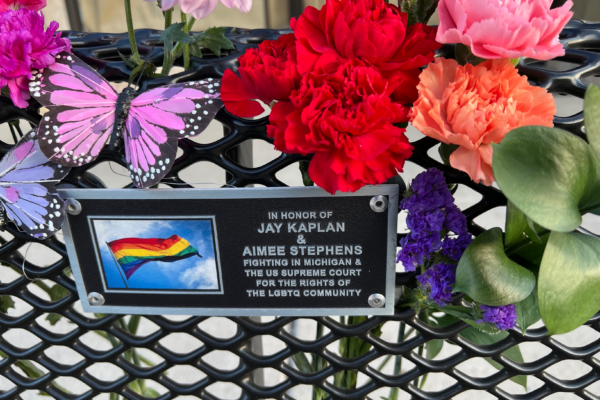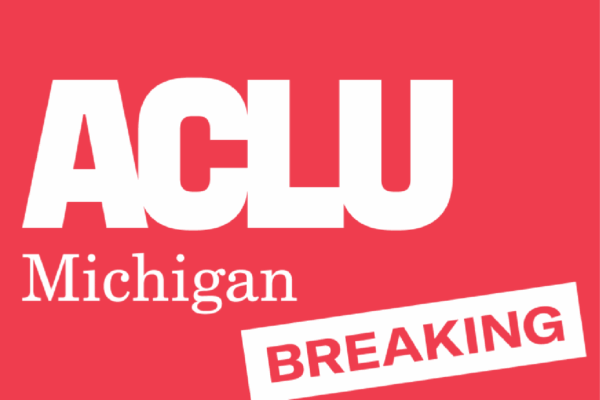FOR IMMEDIATE RELEASE
DETROIT – Today the American Civil Liberties Union of Michigan (ACLU) applauds the Michigan Supreme Court’s ruling that the state’s civil rights law protects LGBTQ people from discrimination.
The Court ruled today, in Rouch World LLC v. Michigan Department of Civil Rights (MDCR), that Michigan’s Elliott-Larsen Civil Rights Act (ELCRA) protects people from discrimination based on sexual orientation. The ACLU and a civil rights coalition of 20 legal, advocacy, and social service organizations filed a friend-of-the-court brief in the Michigan Supreme Court in December and participated in oral argument before the court in March, arguing that ELCRA’s prohibition on discrimination because of sex protects LGBTQ people from discrimination based on sexual orientation and gender identity. Rouch World was originally filed by two for-profit companies that refused to provide services to LGBTQ customers:
- Rouch World rents out property for events in Sturgis and refused to allow a lesbian couple to hold their wedding onsite, and
- Uprooted Electrolysis refused to provide services to a transgender woman.
The ACLU and civil rights coalition argued that the reasoning of the U.S. Supreme Court’s 2020 ruling in the landmark case, Bostock v. Clayton County, Georgia, should be applied in Rouch World: the federal Civil Rights Act of 1964 protects people from discrimination based on their sexual orientation and gender identity. Bostock was heard together with the case of ACLU client and Metro Detroit transgender woman Aimee Stephens, who successfully challenged her firing from a local funeral home for coming out as transgender. The Michigan Supreme Court agreed.
Jay Kaplan, Nancy Katz & Margo Dichtelmiller LGBT Rights Project Staff Attorney with the ACLU of Michigan, has this statement:
“Today’s ruling makes Michigan a state with one of the strongest, most expansive civil rights laws in the country, broadly protecting people who are gay and transgender from discrimination in employment, housing, education, and public accommodations and services. Thank you, Aimee Stephens. Our heroic friend paved the way for today’s historic ruling with bravery and grace for the last seven years of her life, fighting against the discrimination she faced when she was fired for being transgender. The Michigan Supreme Court affirms today what Aimee made possible at the federal level: Michigan civil rights law protects all LGBTQ people from discrimination in our state. All people belong.”
Donna Stephens, widow of Aimee Stephens, has this statement:
“Aimee refused to accept that an employer could discriminate against her simply because she was a trans woman, and fought back by engaging in a lawsuit that went all the way to the U.S. Supreme Court. In a landmark decision, the Court ruled in 2020 that it is illegal for an employer to fire someone for being gay or transgender. Sadly, Aimee didn’t live to celebrate that decision. But her legacy lives on. The path that she helped blaze opened the way for this important ruling by the Michigan Supreme Court. Countless people will benefit as a result.”
The civil rights coalition was represented by Kaplan, ACLU of Michigan legal director Dan Korobkin, and ACLU cooperating attorneys Dan Deacon and Leah Litman, who argued the case. The coalition includes the ACLU of Michigan, the National ACLU, Affirmations LGBTQ+ Community Center, Anti-Defamation League, Equality Michigan, Freedom for All Americans, Gender Identity Network Alliance, GLBTQ Legal Advocates & Defenders, Human Rights Campaign, Lambda Legal Defense & Educational Fund, Inc., LGBT Detroit, Michigan Unitarian Universalist Social Justice Network, National Center for Lesbian Rights, Out Center of Southwest Michigan, Out Front Kalamazoo, Pride At Work Michigan, Ruth Ellis Center, SAGE Metro Detroit, Southern Poverty Law Center, Stand With Trans, and Trans Sistas of Color Project.
###
Related Content

Thinking of Aimee Stephens in the afterglow of a major LGBTQ+ victory in Michigan’s Supreme Court
Stay Informed
Sign up to be the first to hear about how to take action.
By completing this form, I agree to receive occasional emails per the terms of the ACLU’s privacy statement.
By completing this form, I agree to receive occasional emails per the terms of the ACLU’s privacy statement.

